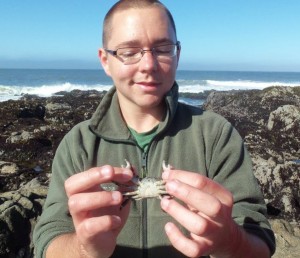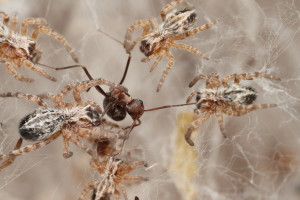Tuesday May 10
07:30 PM
Coevolution in a Bee-Orchid Mutualism
MCZ 101, 26 Oxford Street, Harvard University
**NOTE: DINNER LOCATION CHANGE TO CAMBRIDGE COMMON**
Evolutionary biologists have long recognized the central role that species interactions play in the origin and maintenance of biological diversity. However, the ecological conditions and the genetic mechanisms whereby interacting lineages coevolve and adapt to one other remain poorly understood. My work investigates the genetic bases of coadaptation in a highly specialized plant-pollinator mutualism. Unlike the majority of insects, male euglossine bees do not produce their own pheromones, but instead gather and accumulate perfume compounds (terpenes) from the environment to present subsequently to females during courtship display. Male-gathered perfumes are species-specific, and thus likely mediate reproductive isolation among related bee lineages. A large diversity of orchid species from the American tropics has evolved the production of terpene-rich floral scents to attract male euglossine bees in exchange for pollination services. My research explores the mechanisms of coadaptation and reproductive isolation on both sides of this fascinating mutualism. On the bee side, my research aims to (1) characterize the diversity of perfume phenotypes across the phylogeny of euglossine bees, (2) investigate whether and how male perfume phenotypes mediate reproductive isolation among lineages, and (3) characterize the genetic and functional bases of sensory (olfactory) perception that control perfume specificity. On the orchid side, my work aims to (4) elucidate the ecological and chemical mechanisms of scent-mediated pollinator specificity, (5) determine whether and how divergent floral scent phenotypes promoted the evolution of reproductive isolation, and (6) characterize the genetic mechanisms that regulate scent production and differentiation among related orchid lineages. My research integrates approaches from multiple disciplines including evolutionary biology, genomics, molecular biology, chemistry and physiology to investigate how genetic toolkits are coopted to generate the intricate associations we observe between species in nature.
The talk is free and open to the public. The meeting is readily accessible via public transportation. Parking is available in the Oxford Street Garage with advance arrangement, as described here, or (usually but not always) at spaces on nearby streets. Everyone is also welcome to join us for dinner before the talk (beginning at 5:45 PM) at the Cambridge Common, 1667 Massachussetts Avenue, Cambridge.
CEC meetings are held the second Tuesday of the month from October through May. The evening schedule typically includes an informal dinner (5:45 to 7:15 PM) followed by our formal meeting (7:30 – 9:00 PM). The latter begins with club business and is followed by a 50 minute entomology related presentation. Membership is open to amateur and professional entomologists.





